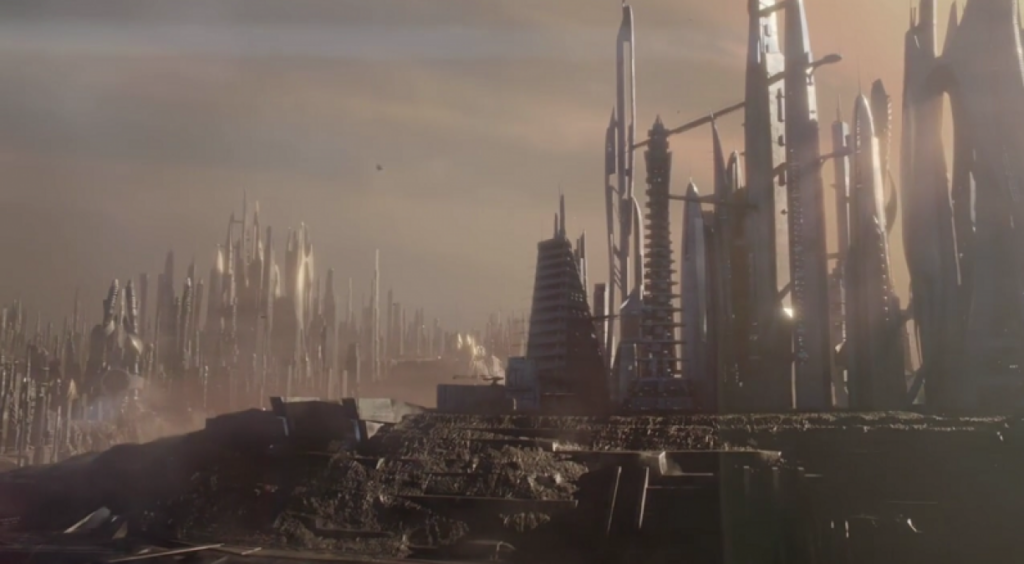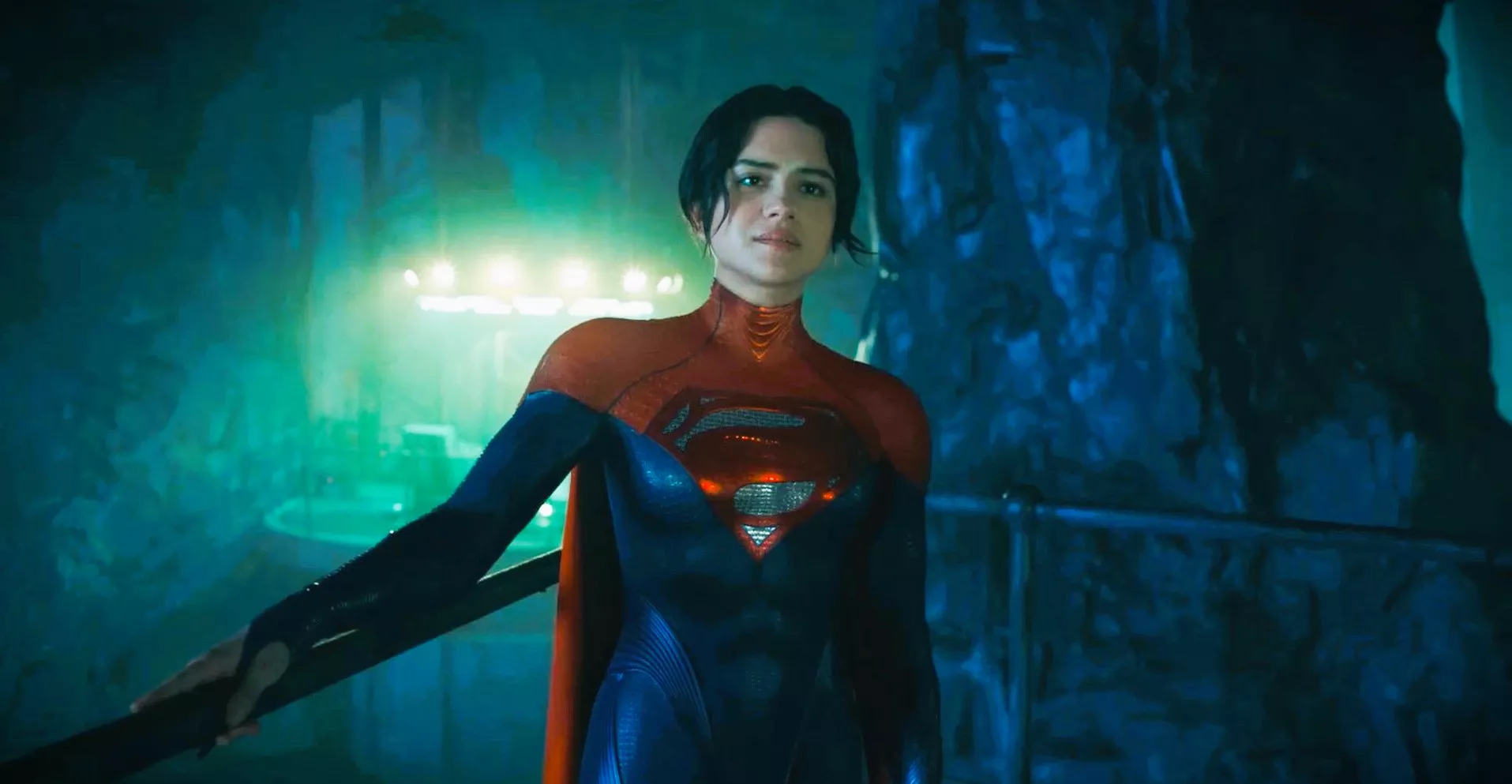Sasha Calle’s limited screen time in The Flash doesn’t hinder her impact. If only the entire movie fully embraced Supergirl’s presence, it would have soared to new heights.
Warning: The following content contains significant spoilers for The Flash.
In The Flash, Sasha Calle delivers a brief yet insistent statement about the beauty of Krypton during a pivotal scene for her character. Up until this moment, we have learned about the hardships and misery in Calle’s Supergirl’s life. She was held captive by the Russian government for years, subjected to experiments and presumed torture in a desolate Siberian prison.
Given her experiences, it’s understandable that this Supergirl would be distrustful and even disdainful of human civilization on Earth. Even when freed from the Russians and brought into the sunlight at Wayne Manor, she remains cold towards the Barrys’ attempts to recruit her in their fight against General Zod, a fellow Kryptonian. Earth, despite its sunny glow, appears bleak to her after enduring such treatment.
However, when confronted with Zod’s own cruelty and witnessing his lieutenants’ slaughter of American soldiers, who came in peace, Calle’s Kara Zor-El is reminded of the monstrous nature of her own people. It is at this moment that she returns to Wayne Manor and embraces the men who freed her, joining their cause. She even assists the older Barry in regaining his superpowers by flying him into a thunderstorm.
During this reflection on the horrors she witnessed in Russia and the atrocities committed by her own Kryptonian kin, Kara utters the line, “Krypton was a beautiful place.” This statement signifies an attempt by Warner Bros. Pictures to redeem the original misstep of Man of Steel (2013), which set the DCEU on a dark path from which it has struggled to recover.
Andy Muschietti’s The Flash acknowledges the influence of Zack Snyder’s film, as the visual aesthetics and portrayal of the House of El’s super-suits are reminiscent of Snyder’s work. Sasha Calle’s Supergirl even wears a variation of the costume first worn by Henry Cavill a decade ago. However, Man of Steel established the tone for the DCEU, paving the way for the divisive “Snyderverse” that followed.
Man of Steel, drawing inspiration from Christopher Nolan’s The Dark Knight trilogy, explores the reaction of governments and institutions to the existence of Superman. It poses the question raised by Alan Moore: How would the world respond to the realization that a god-like being is real and happens to be American?
While resembling Nolan’s depiction of a city responding to a vigilante like Batman, Zack Snyder’s execution differs from Nolan’s style. Though the setup of Man of Steel is promising, its execution marks the early stumbling of the DCEU. In Snyder’s 2013 film, Krypton is portrayed as a decaying dystopia nearing its end. The society is engulfed in dull browns, yellows, and gray skies, with flying beasts burdening them amidst constant civil war. It’s akin to a late-stage eugenics project, with Jor-El being the sole courageous figure who opposes his government’s excesses and conceives a child in the traditional, biological manner.

As the grown-up son, Kal-El (played by Henry Cavill), seems to inherit traits from his father. Despite being raised with love by his earthly parents in Kansas, portrayed by Kevin Costner and Diane Lane, Kal/Clark holds a wary and even scornful attitude towards humanity. Snyder occasionally presents him as truly alien, with glowing eyes that have a faintly demonic appearance above a perplexed Lois Lane (Amy Adams).
Even when Superman makes the right choices, it’s done reluctantly. Faced with a dilemma similar to what Kara Zor-El will encounter in The Flash, he confides in a priest, expressing doubts about Zod’s trustworthiness and the faith he can place in the people of Earth. With a stained glass representation of Christ above Cavill’s head, Snyder’s message is clear: Superman is a messianic figure who will sacrifice himself for an unappreciative and undeserving humanity. This theme permeates much of the Snyderverse, including Superman’s statement to Lois that “no one stays good in this world,” as he prepares himself to carry out Lex Luthor’s bidding and confront Batman in Batman v Superman: Dawn of Justice (2016).
In contrast, despite wearing the same insignia as Cavill’s Superman in The Flash, Calle’s Supergirl genuinely appears to believe in the concept of hope during her brief appearance in the film. Unlike Snyder’s Superman, she embraces those words and embodies them on screen.
Director Muschietti made a remarkable discovery in casting Sasha Calle as Supergirl in The Flash, recognizing her talent during auditions despite her limited previous credits. In her performance, Calle’s thousand-yard stare conveys a profound depth, showcasing empathy and an undeniable connection with others. Although her character’s journey is constrained by the ensemble nature of the movie, Calle manages to express both palpable melancholy and unwavering conviction. Unlike Clark Kent’s idyllic upbringing in the rural Midwest, Kara has valid reasons to harbor resentment towards humanity.
Man of Steel contrasts Clark’s confession to a priest with a flashback depicting his childhood bullying, highlighting the extent of his suffering. On the other hand, Kara experienced what Pa Kent, portrayed with curious objectivist beliefs by Kevin Costner, feared might happen to Clark: being captured and imprisoned by an authoritarian regime as a prized subject of research. However, in the limited narrative space of The Flash, Kara is not shattered or resigned to the cynicism and self-pity that defined Cavill’s Superman in Man of Steel and Batman v Superman. Instead, she recognizes Barry’s kindness and acknowledges his role in saving her from the torment of the laboratory, an act that others, including Batman portrayed by Michael Keaton, failed to do.
Moreover, witnessing the despicable nature of some of her fellow Kryptonians, Kara does not align herself with Batman and the Flashes out of resignation or by choosing the lesser evil. She sees goodness in them, even finding hope. Therefore, she insists that Krypton is beautiful—an idea that cannot be deduced from or judged solely by Zod’s actions.
While Kara’s memories of Krypton set her apart from Superman, there is a deeper significance to her assertion. In Man of Steel’s pessimistic tone, the world that gave birth to “Superman” held no beauty. It was characterized by Orwellian elements, and even Superman himself passes judgment on it after encountering Zod, effectively representing his entire homeworld. He proclaims, “Krypton had its chance,” using his demonic red eyes to obliterate Zod’s eugenicist project at the movie’s climax. It was yet another ugly aspect in a film that ultimately embraced darkness.
After Kara’s display of optimism for Earth and Krypton in The Flash, I had hope that it would redeem the original sins of Man of Steel. It wasn’t just the misanthropic view of Superman that led the DCEU astray, but also his actions. The film carelessly and insensitively portrayed imagery reminiscent of 9/11, treating it like an Instagram filter, with Superman and Zod decimating Metropolis in a battle filled with collapsing skyscrapers. Superman never seemed to show any concern for the devastation he caused. Instead, he pauses to share a romantic moment with Lois Lane amidst the rubble, disregarding the presumed deaths of hundreds of thousands of people.
The Flash doesn’t provide an opportunity for the characters to learn from that mistake; instead, it largely ignores it by setting the climax of the movie in a desert, away from a densely populated area. This could have been a chance for Supergirl to rectify the mistakes made by her alternate timeline cousin. She could have defeated Zod without causing the deaths of thousands or resorting to neck-snapping brutality, reminiscent of a Spartan warrior at the gates of Thermopylae. This iteration of Supergirl appears to care more about humans than Cavill’s Superman, pausing her fight with Zod to save a spiraling helicopter, only to become enraged when Zod destroys the same helicopter, killing the pilots out of spite.
In those brief moments, it felt like the better DC comics’ portrayal of their Kryptonians: creating heroes motivated by hope and faith in people’s ability to do what’s right. She wasn’t fighting out of reluctant obligation or resentment.
Unfortunately, it doesn’t matter. Ultimately, The Flash avoids allowing her to defeat Zod in a King Kong-like manner, nor does it grant her victory in the battle. In fact, she is abruptly and brutally killed by Zod multiple times. This shocking twist, along with the repeated deaths of Keaton’s Batman, supposedly adds dramatic peril to Barry’s journey. For some reason, Zod winning this battle is considered canonical, despite previously witnessing his defeat in Man of Steel, and Barry must accept that he cannot change the past. Instead, he erases it, at least in this timeline. As a consequence, it seems that Calle’s Kara is also erased from existence.
I can’t help but wonder if this creative choice was a result of post-production reshoots and editing revisions. Supergirl and even Keaton’s beloved Batman are abruptly removed from the movie, their characters seemingly discarded, only to be replaced by (of all people) George Clooney. While it may be somewhat cathartic for Barry’s personal journey, it’s underwhelming as a film experience. Half of the established elements are disregarded in favor of tasteless fan service that brings Christopher Reeve and George Reeves back from the dead.
Unintentionally, the movie may even be seen as vindicating the cynicism inherent in Snyder’s vision. Altruism, heroism, and faith in humanity are portrayed as foolish notions. To defeat Zod, one must become indistinguishable from him.
Considering the behind-the-scenes reshuffling, this awkward ending may mark the last appearance of Keaton as Batman and Calle as Supergirl. It’s a shame for both actors, but particularly for the latter, as we barely had a chance to truly know this interpretation of the character. Nonetheless, it was far superior to anything we experienced during the Snyder years.
